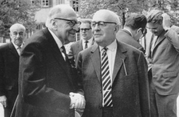Max Horkheimer
Ìrísí
| Max Horkheimer | |
|---|---|
 Max Horkheimer (front left), Theodor Adorno (front right), and Jürgen Habermas (in the background, right), in 1965 at Heidelberg. | |
| Orúkọ | Max Horkheimer |
| Ìbí | Oṣù Kejì 14, 1895 Stuttgart, Württemberg, Germany |
| Aláìsí | July 7, 1973 (ọmọ ọdún 78) Nuremberg, Bavaria, Germany |
| Ìgbà | 20th century philosophy |
| Agbègbè | Western Philosophy |
| Ẹ̀ka-ẹ̀kọ́ | Critical Theory |
| Ìjẹlógún gangan | Social Theory, Counter-Enlightenment |
| Àròwá pàtàkì | Critical Theory, The Culture Industry, Authoritarian Personality, Eclipse of Reason |
| Ìkan nínú àyọkà lórí |
Ilé-Ẹ̀kọ́ Frankfurt |
|---|
 |
| Àwọn ìwé pàtàkì |
|
Reason and Revolution Dialectic of Enlightenment Minima Moralia Eros and Civilization One-Dimensional Man Negative Dialectics |
| Àwọn aṣèròjinlẹ̀ pàtàkì |
|
Max Horkheimer · Theodor Adorno Herbert Marcuse · Erich Fromm · Friedrich Pollock Leo Löwenthal · Jürgen Habermas |
| Important concepts |
|
Critical theory · Dialectic · Praxis Psychoanalysis · Antipositivism Popular culture · Culture industry Advanced capitalism · Privatism |
Max Horkheimer (February 14, 1895 – July 7, 1973) je amoye-aseoro-awujo omo Ju ara Jemani, to gbajumo fun ise re ninu irojinle alagbewo gege bi okan ninu 'Frankfurt School' fun iwadi awujo. Ninu awon iwe re pataki je The Eclipse of Reason (1947) ati eyi to ko pelu Theodor Adorno, The Dialectic of Enlightenment (1947). O sese opo pataki ni Frankfurt School.[1]

|
Àyọkà yìí tàbí apá rẹ̀ únfẹ́ àtúnṣe sí. Ẹ le fẹ̀ jù báyìí lọ tàbí kí ẹ ṣàtúnṣe rẹ̀ lọ́nà tí yíò mu kúnrẹ́rẹ́. Ẹ ran Wikipedia lọ́wọ́ láti fẹ̀ẹ́ jù báyìí lọ. |
Itokasi
- ↑ "Horkheimer, Max" Dictionary of the Social Sciences. Craig Calhoun, ed. Oxford University Press 2002. Oxford Reference Online. Oxford University Press. College of the Holy Cross. 14 October 2009 <http://www.oxfordreference.com/views/ENTRY.html?subview=Main&entry=t104.e767>